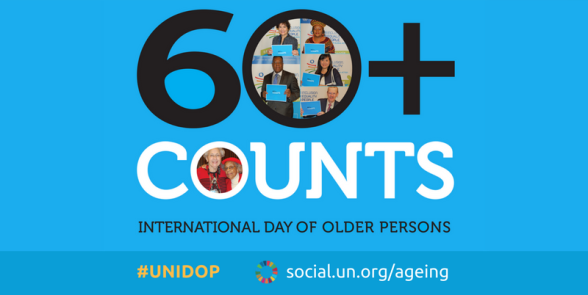 October 1 is the International Day of Older Persons, when each year we recognise, remember and celebrate Older Persons.
October 1 is the International Day of Older Persons, when each year we recognise, remember and celebrate Older Persons.
The theme this year asks, Pandemics: Do They Change How We Address Age and Ageing?, and introduce the Obervance like this:
The year 2020 marks the 75th Anniversary of the United Nations and the 30th Anniversary of the International Day of Older Persons. This year has also seen an emergence of COVID-19, that has caused an upheaval across the world.
Considering the higher risks confronted by older persons during the outbreak of pandemics such as COVID-19, policy and programmatic interventions must be targeted towards raising awareness of their special needs.
Recognizing older persons contributions to their own health and the multiple roles they play in the preparedness and response phases of current and future pandemics is also important.
The 2020 theme for the International Day of Older Persons aims to:
- Inform participants about the strategic objectives for the Decade of Healthy Ageing.
- Raise awareness of the special health needs of older persons and of their contributions to their own health and to the functioning of the societies in which they live.
- Increase awareness and appreciation of the role of the health care workforce in maintaining and improving the health of older persons, with special attention to the nursing profession
- Present proposals for reducing the health disparities between older persons in the developed and developing countries, so as to “Leave no one behind”.
- Increase understanding of the impact of COVID-19 on older persons and its impact on health care policy, planning, and attitudes.
Some key facts about Ageing and health from the World Health Organisation (2018) are startling, and remind us of the importance of changing attitudes towards older persons.
- Between 2015 and 2050, the proportion of the world's population over 60 years will nearly double from 12% to 22%.
- By 2020, the number of people aged 60 years and older will outnumber children younger than 5 years.
- In 2050, 80% of older people will be living in low- and middle-income countries.
- The pace of population ageing is much faster than in the past.
- All countries face major challenges to ensure that their health and social systems are ready to make the most of this demographic shift.
It is important we all think of ways to reduce the stigma of ageing, and the ageist attutudes about older persons. Whilst dementia is anot a normal part of ageing, our risk factor goes up with age. In this article, Positive attitudes about aging reduce risk of dementia in older adult, reporter Michael Greenwood shares som eimprtant research about how improving attitudes towards older persons, can reduce their risk of getting dementia.
Positive attitudes about aging reduce risk of dementia in older adult
By Michael Greenwood, published on 7 February 2018
Research has shown that older persons who have acquired positive beliefs about old age from their surrounding culture are less likely to develop dementia. This protective effect was found for all participants, as well as among those carrying a gene that puts them at higher risk of developing dementia, a new study led by the Yale School of Public Health has found.
Published today in the journal PLOS ONE, the study reports that older persons with positive age beliefs who carry one of the strongest risk factors for developing dementia — the ε4 variant of the APOE gene —were nearly 50% less likely to develop the disease than their peers who held negative age beliefs.
The study is the first to examine whether culture-based age beliefs influence the risk of developing dementia among older people, including those who carry the high-risk gene variant.
“We found that positive age beliefs can reduce the risk of one of the most established genetic risk factors of dementia,” said lead author Becca Levy, professor of public health and of psychology. “This makes a case for implementing a public health campaign against ageism, which is a source of negative age beliefs.”
